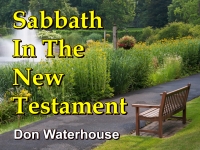Sabbath In The New Testament
Don Waterhouse

Last week we began a subject of the Sabbath and I showed you from the Old Testament that without question the Saturday Sabbath which is the only Sabbath ever mentioned in the Bible and really the only Sabbath there can possibly be because the Sabbath refers to a particular day. That Saturday Sabbath from sunset Friday to sunset Saturday is indisputable, there's no question about it, there is no religious organization, there is no religious commentary that I've ever seen or heard about, there is no one who studies the Bible that questions the fact as to when the weekly Sabbath was in the Old Testament, there is no question...
Transcript of this Sermon coming.
Sermon Date: 1978






